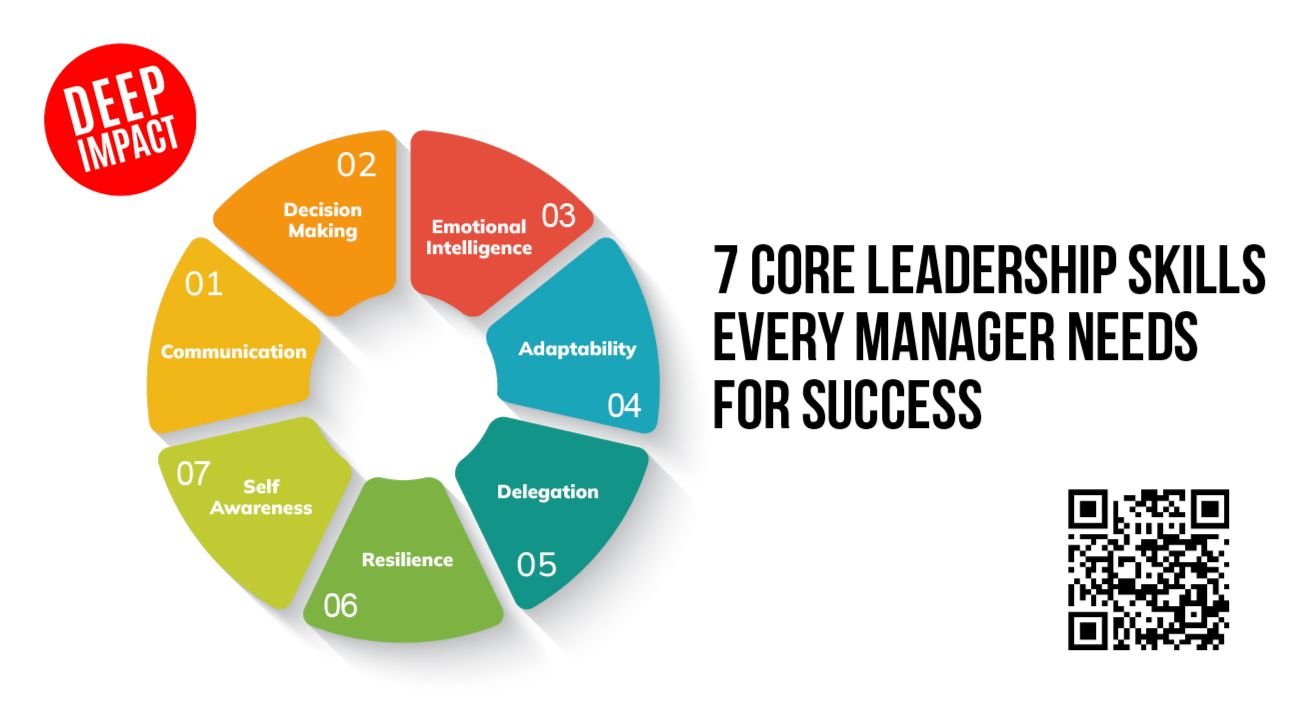Leadership is often perceived as an innate talent, but the truth is that it is a skill set that can be developed. As the business landscape continues to evolve, managers who invest in mastering core leadership skills can guide their teams to success regardless of industry changes and build them as successful leaders with strong leadership skills. Furthermore, mastering core leadership skills are required for everyone in leadership positions to be a successful leader.
We have listed seven essential leadership skills that every manager needs to excel as a part of leadership development and transform themself to be effective leaders. These valuable leadership skills have stood the test of time and continue to be relevant across all industries for every leadership position.
1. Communication: The Foundation of Great Leadership
Communication is not just a leadership skill, but also the cornerstone of effective leadership qualities. Studies show that 86% of employees and executives cite a lack of collaboration and ineffective communication as the primary causes of workplace failures. Every leader must develop strong communication skills as managers must be adept at both delivering clear, concise instructions and listening actively to their team members.
Why It Matters: In today’s multi-cultural work environments, communication is more than passing on information and is a critical ingredient for building an open culture where team members feel respected and heard. Leaders who are great communicators can build bridges across various departments to achieve consistency in expectations and get alignment between groups. Communicating is pivotal for team success, be it in conflict resolution or alignment of the company’s business goals. Builds trust, encourages collaboration and improves performance.
Fact: According to a study by the Holmes Report, poor communication costs companies an average of $62.4 million annually. Moreover, the same source cited that miscommunication also affects smaller companies of 100 employees, where they can potentially lose more than $420.000 per year. This is the reason why leaders with strong communication skills will have a great impact in the workplace.
Practical Tip: Schedule regular feedback sessions with your team to foster an open, two-way communication flow. In these sessions, make it a point to not just give feedback but to ask for it as well. This demonstrates that their opinions matter, building a foundation of trust and mutual respect. Beyond discussing performance, use this time to align on goals, address challenges, and brainstorm solutions together. Encouraging open dialogue with active listening helps create a culture of transparency and continuous improvement.
2. Decision-Making: Balancing Strategy and Intuition

Effective decision-making is a critical skill for managers, especially in fast-paced environments. Together with critical thinking skills, an effective leader needs to make informed decisions quickly while balancing strategic analysis (some may act with their gut instincts as well). According to McKinsey & Company, companies that consistently make data-driven decisions are 23 times more likely to acquire customers and 6 times more likely to retain them. While data provides concrete insights that guide logical, evidence-based decisions, a leader’s intuition (honed through experience) can play a pivotal role in navigating uncertainty or incomplete information.
Why It Matters: Good decision-making helps teams stay focused and avoid delays. Managers who are confident in their decisions also build confidence within their teams, which enhances productivity and morale. No matter what the industry of the company is as well as its size, effective decision-making will able to help companies generate long-term success.
Fact: A study from Bain & Company found that decision effectiveness accounts for 95% of business performance. This is the reason why decision-making skills are often hailed as one of the most important factors that contribute company’s success.
Practical Tip: Use structured tools such as decision matrices or pros and cons lists when faced with tough decisions. These can help clarify complex choices and make them more manageable. Furthermore, you can improve your decision-making by setting limitations for yourself, from limited choices to set time limits. This can help you to build better decision-making skills effectively in the shorter time frame.
3. Emotional Intelligence: Leading with Empathy
Emotional intelligence (EQ) is one of the leadership traits that has become increasingly important in modern leadership. Business leaders with high EQ can help relationship building in the workplace more effectively, manage conflicts with grace, and build stronger, more cohesive teams. Research by TalentSmart found that emotional intelligence is responsible for 58% of job performance across industries.
Why It Matters: Successful leaders with high emotional intelligence create environments where employees feel heard and valued. This fosters loyalty and increases engagement—two key factors in team performance and retention. Emotional intelligence is one of the most important leadership skills. A person in a leadership role who lacks emotional intelligence will struggle to acknowledge employee’s concerns and complaints.
Fact: A study published in the Harvard Business Review found that employees with managers who have high emotional intelligence report higher job satisfaction and lower stress levels. In addition, a leader who lacks emotional intelligence often leads to misunderstandings and poor conflict resolution in the workplace. That is the reason why emotional intelligence become a must-have skill to be an effective leader.
Practical Tip: Practice empathy by paying attention to your team’s emotional cues and adjusting your communication style to meet their needs. It’s not just about what you say, but how you say it. In addition, you also need to train yourself to be an active listener. By being an active listener, you not only listen to your colleagues but also truly understand them and can provide the right response. This is an effective way to hone your emotional intelligence as a leader.
4. Adaptability: Thriving in Change

Adaptability is no longer just a nice-to-have—it’s essential. In a world of constant change, managers need to quickly pivot and guide their teams through transitions. A report by Deloitte found that companies with highly adaptable leaders are 1.5 times more likely to achieve above-average financial performance.
Why It Matters: Adaptable leaders not only navigate change effectively but also inspire their teams to embrace uncertainty as an opportunity for growth. This is particularly important in industries undergoing digital transformation, where agility is a competitive advantage. Leaders who can adjust their strategies and approaches based on new information or shifting market conditions empower their teams to do the same. As a result, businesses become more resilient, innovative, and ready to capitalize on emerging trends.
Fact: According to Gartner, 75% of businesses see adaptability as a crucial skill for future leaders. This underscores the growing recognition that rigid leadership models are becoming obsolete. In an era where unexpected disruptions—like technological advancements, market fluctuations, or global crises—can emerge at any time, the ability to adapt quickly separates successful organizations from those that falter.
Practical Tip: Encourage adaptability in your team by promoting a solution-focused mindset. View challenges as learning opportunities rather than roadblocks. This can be done by celebrating innovative problem-solving, promoting cross-functional collaboration, and offering flexibility in how goals are achieved. When leaders model this behavior, they create a culture where adaptability thrives, equipping the entire organization to handle whatever comes next.
5. Delegation: Empowering Your Team
Delegation is often underutilized by managers, but it’s one of the most powerful tools in leadership. Managers who delegate effectively not only reduce their workload but also empower their team members to develop new skills and take on more responsibility.
Why It Matters: Effective delegation leads to better time management and higher team morale, as employees feel trusted and valued. By allowing team members to step up, take ownership, and solve problems, leaders create an environment where growth and innovation are encouraged. Leaders who delegate well can focus on higher-level strategic tasks that drive business growth.
Fact: A study by Gallup found that CEOs who effectively delegate generate 33% more revenue than those who do not. This highlights the financial impact of empowering teams to handle operational tasks, enabling leaders to dedicate their energy toward vision-setting, market expansion, and innovation.
Practical Tip: Assign tasks that align with your team’s strengths, providing clear guidance but also allowing autonomy. Be intentional in how you delegate, and ensure that tasks are not simply offloaded but matched to individuals who can benefit from the challenge. By offering support when necessary while still granting freedom, you can foster a sense of ownership and promote personal growth within the team.
6. Resilience: Leading Through Tough Times
Resilience—the ability to recover from setbacks and maintain focus in the face of adversity—is one of the most valuable traits for any leader. Managers who can stay calm and composed during difficult times set the tone for their teams to remain positive and productive.
Why It Matters: In challenging situations, resilient leaders provide stability, helping teams navigate uncertainty without losing momentum. This is particularly critical during economic downturns, internal restructures, or market disruptions. Resilient leadership fosters a culture of perseverance, ensuring that teams remain focused and motivated even when faced with obstacles.
Fact: Research published by the American Psychological Association shows that resilience in leadership is directly linked to improved team morale and productivity. A good leader who maintains a calm, solution-oriented approach during crises enables their teams to follow suit, reducing the risk of burnout and fostering an environment where challenges are viewed as opportunities to grow.
Practical Tip: Build resilience by adopting stress management techniques like mindfulness and time-blocking. Encourage your team to do the same, ensuring everyone has the tools to cope with pressure. Simple practices like regular breaks, prioritizing tasks, and open communication about workload can make a significant difference in how well teams handle stressful situations. By embedding resilience into daily routines, you ensure your team is prepared to tackle tough times with confidence.
7. Self-Awareness: The Key to Personal and Team Growth

Self-awareness is one of the most fundamental leadership skills. Leaders who understand their strengths, weaknesses, and how they impact others are better equipped to make informed decisions and build stronger relationships within their teams.
A 2018 study by Green Peak Partners and Cornell University found that self-awareness was the strongest predictor of overall success for leaders. A study conducted by the Korn Ferry Institute revealed that companies with self-aware leaders consistently outperformed those with lower levels of self-awareness, showing a 10% increase in profitability over 30 months.
Self-awareness not only contributes to leadership success but also has a tangible impact on organizational performance.
Therefore, by developing self-awareness, leaders can enhance their effectiveness, positively influence their teams, and drive better organizational outcomes.
Why It Matters: Self-awareness not only contributes to leadership success but also has a tangible impact on organizational performance. Leaders who are aware of their own behaviors and emotional responses can more effectively communicate with their teams, anticipate challenges, and adapt their leadership styles when necessary. This will create a culture of openness and trust. Such leaders are more likely to seek feedback and adjust their leadership style with thoughtful decisions to better meet the needs of their teams, leading to higher levels of engagement and performance.
Fact: Research from Harvard Business Review has shown that self-awareness is a critical trait for effective leadership. Leaders who actively practice self-reflection and embrace feedback demonstrate higher emotional intelligence, which strengthens team dynamics and drives better business results.
Practical Tip: Regularly seek feedback from colleagues and mentors to better understand your leadership style. Self-reflection, paired with external input, is key to continuous improvement. Additionally, consider using tools like 360-degree feedback assessments to gain a comprehensive understanding of how others perceive your leadership. Take actionable steps to improve in areas where blind spots may exist.
Conclusion: The Power of Evergreen Leadership Skills
Leadership may evolve over time, but certain skills remain constant. By mastering these seven core leadership skills—communication, decision-making, emotional intelligence, adaptability, delegation, resilience, and self-awareness—managers can lead their teams to success in any environment. These timeless skills not only help leaders navigate today’s challenges but also prepare them for the unforeseen demands of the future. They ensure that managers foster strong team dynamics, drive productivity, and create a positive, growth-oriented culture.
For those looking to develop or refine these essential leadership abilities, Deep Impact offers customized programs designed to help managers and leaders thrive. Contact us today to learn more about how we can help you grow as a leader.
You might also like: Best Leadership Training Provider in Singapore







